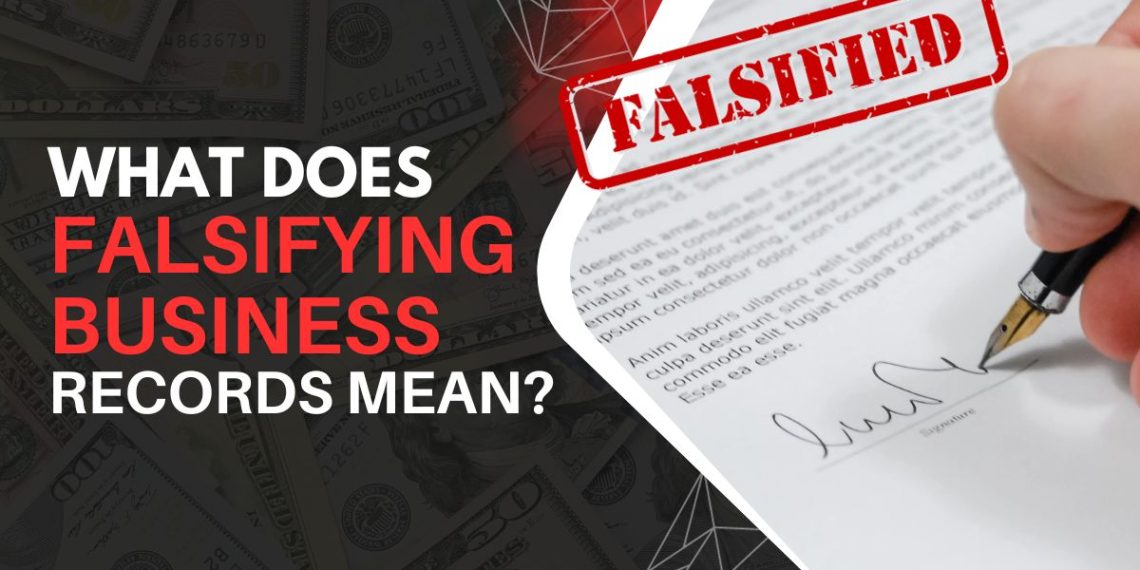Falsifying documents or records is a crime under several US state laws. It can be used to harm competitors or take unfair advantage of certain benefits. So, what does falsifying business records mean? Let’s find out.
Maintaining accurate and truthful records is a fundamental practice in the complex business world. After all, it ensures transparency, accountability, and the integrity of financial and operational data. However, falsifying business records is a grave violation of this trust. This article aims to answer the question, “What does falsifying business records mean? “ It will also discuss the meaning, legal implications, and the significant consequences for individuals and organizations.
What does falsifying business records mean?

Falsifying business records, sometimes called record tampering or manipulation, is when people or companies purposefully change, create, or lie about important documents. These records could be tied to a business’s money matters, day-to-day operations, or various activities.
Moreover, these documents include financial reports, bills, agreements, tax papers, and worker files. The main reason behind messing with these records is to trick different people, like investors, government regulators, or regular folks, into thinking the business is doing better or worse financially or operationally than it actually is.
To shed more light on what does falsifying business records means, let’s see some examples and reasons and discover how it happens.
What does falsifying business records mean? Examples of falsifying documents
Think of it like putting up a smokescreen – it’s all about hiding the true state of the business. It’s not just one document or a specific kind of record that gets messed with; it could be many important records, each showing something crucial about how the business is doing. For instance, it could be a financial report that tells you how financially strong the company is or a bill that shows the terms of a business deal.
Tax documents are another example – they prove whether a business is following the tax rules. Moreover, even worker records, like who’s on the payroll and how much they get paid, can be fiddled with.
Reasons for falsifying documents
What does falsifying business records mean? Now, why do people do this tricky stuff? Well, there are a few reasons. Sometimes, businesses might exaggerate their profits in financial reports to attract investors. Or they might downplay their losses to get loans with better terms. Additionally, some companies might create fake bills or receipts to make it look like they’re making more money and spending less.
And then there’s the hiding of debts or making them seem smaller than they are to make the business look financially stronger. On top of that, some businesses might mess with worker records like how much they’re paid or how many hours they work to cut labor costs or dodge taxes.
In a nutshell, falsifying business records is like a sneaky plan to make a business look richer or healthier than it is. It’s done by playing around with various documents, making it seem like everything is fine when it might not be. But doing this doesn’t just break trust with people who rely on these records; it can also lead to serious legal problems and financial troubles for the folks involved.
How are records falsified?
Falsifying business records can manifest in various ways, including:
- Altering financial statements: This involves changing figures in financial reports to either inflate profits or understate losses. It may also include making false claims about assets or liabilities.
- Fabricating invoices and receipts: Some businesses may create bogus invoices or receipts to state a higher income, lower expenses, or inflate the value of assets.
- Hiding liabilities: Concealing debts, obligations, or liabilities can give the appearance of a healthier financial position than is actually the case.
- Misrepresenting employee records: Falsifying employee records, such as payroll and hours worked, may be used to minimize labor costs or evade taxes.
- Misreporting tax information: Falsifying tax documents, such as underreporting income or inflating deductions, is a common form of record falsification that can lead to tax evasion charges.
What does falsifying business records mean in legal terms?

Under New York State law, falsifying business records in the second degree is a class A misdemeanor. While falsifying documents in the first degree is considered a class E felony.
The legal consequences of messing with business records are serious and can be a big problem for those involved. When people or companies start changing or lying about important records, they’re setting themselves up for a lot of legal issues:
Criminal charges
Faking business records can get you into legal trouble. Depending on how bad the changes were and what they tried to do, individuals or companies might face charges like fraud, forgery, or perjury. These charges can lead to fines, probation, or even time behind bars.
Civil penalties
On top of criminal charges, businesses might have to pay fines and give back money to fix the damage caused by their fake records. Sometimes, people hurt by the deception, like investors or creditors, might even take the business to court to get their money back, piling on more financial problems.
Regulatory trouble
Government agencies that monitor different industries can also take action against businesses and individuals that mess with records. For instance, the Securities and Exchange Commission (SEC) watches over financial markets, and the Internal Revenue Service (IRS) deals with taxes. They can slap businesses and people with fines, penalties, and other actions to enforce the rules.
Reputation damage
Changing records doesn’t just hurt the numbers. Instead, it also hurts a company’s reputation. When people like investors, customers, and business partners can’t trust a company because of fake records, it can make it challenging for the company to keep going and do well.
Losing licenses
Many businesses need licenses or permits to work legally. So, messing with records can lead to losing those licenses, which means the business can’t keep running.
Going to jail
In some cases, if people are caught messing with business records, they might end up in jail. How long they stay there depends on how serious the changes are and what the law says.
Getting sued
When fake records cause financial problems for others, those affected might sue the people or businesses responsible. This can mean more financial and legal trouble for those involved in the deception.
What does falsifying business records mean? So, in short, the legal consequences of falsifying business records can be a real mess. It affects the people who do it and the businesses they work for. How bad things get depends on the big changes, who was hurt, the rules in place, and what laws were broken. It’s super important for people and businesses to realize the big legal risks tied to this kind of shady behavior. That’s why by keeping records honest, accurate, and transparent, you can avoid these legal headaches.
What does falsifying business records mean? Impact on companies

The consequences for businesses that engage in the practice of falsifying business records can be severe and far-reaching, impacting various aspects of their operations and standing. Let’s delve deeper into these consequences:
Loss of trust and credibility
Think of trust as the most important component of business relationships. When a business starts faking records, it’s like breaking that trust. Thus, people who rely on those records, like investors, customers, suppliers, and partners, get wary. They might think, “Can we trust these folks anymore?” And when trust is broken, it’s really tough to repair.
Financial instability
Accurate records help businesses make smart decisions. But if the records are messed with, they don’t show the true financial picture. Imagine if you thought you had more money in your bank account than you actually did – you might make some risky decisions thinking you’re financially stable. That’s what happens to businesses with fake records. It can lead to bad decisions, even bankruptcy.
Operational disruption
Legal problems and investigations caused by record fakery can disrupt daily business operations. Preparing for court, going to hearings, and dealing with the fallout eat up time and resources, making things less smooth.
Deterrence of investment
Investors are like the lifeblood of a business; they provide the money needed to grow. But if a business has a history of messing with records, investors lose confidence. Consequently, they don’t want to put their money in a company with a shady financial past.
Increased regulatory scrutiny
Government agencies, like the SEC or IRS, start keeping a very close eye on businesses that fake records. This means more rules to follow and more time and money spent on compliance instead of running the business.
Legal costs
Legal actions aren’t cheap. Defending against criminal charges and paying fines, restitution, and legal fees can be a heavy financial burden.
Reputation damage
Reputation matters a lot. When your reputation is tarnished because of record faking, it can drive customers, suppliers, and potential business partners away. That might mean lost contracts, customers, and opportunities.
Revocation of licenses or permits
Many businesses need licenses or permits to operate legally. When they fake records, they can lose these licenses, and that means they can’t run their business properly.
Trouble recruiting and keeping good people
Talented folks may not want to work for a business with a history of record faking. They’d rather look for jobs elsewhere, making it hard for the business to attract and keep the best talent.
The Impact of Falsified Records on Market Value and Stock Prices
In publicly traded companies, falsifying records reduces company value. Investors sell shares, causing financial losses and weakening the business.
What does falsifying records mean? It means consequences go beyond legal issues and financial penalties. They affect a company’s core operations, growth, and success. Therefore, prioritizing integrity, ethical conduct, and maintaining accurate records is crucial to avoid severe consequences.
What does falsifying business records mean? Impact on individuals

Getting involved in faking business records can lead to serious consequences for people. Let’s break it down without all the legal jargon:
Criminal charges and legal penalties
Imagine knowingly doing something wrong and facing the law. People involved in faking business records might end up in serious trouble. They could be charged with fraud, forgery, or perjury, depending on how much they were involved. Additionally, the consequences can be harsh, like hefty fines, probation, or even going to jail. This criminal record can hang over their lives, making it hard to find jobs or do everyday activities.
Civil liability
It’s not just about criminal charges. People who lose money because of these fake records can sue those responsible. They must repay the money if they’re found guilty, which can be a huge financial burden. Moreover, these lawsuits can keep the legal and financial problems going long.
Loss of employment
Many times, people caught messing with records are company employees. When their actions are exposed, they often lose their jobs right away. Imagine suddenly not having a job or income—it’s a big blow, affecting them and their families.
Damage to professional reputation
Furthermore, people in jobs that need trust, like accountants or financial analysts, risk wrecking their professional reputations. If they have a history of messing with records, finding work in their field is challenging. Their credibility takes a hit, significantly limiting job opportunities.
Difficulty in obtaining credit and loans
Having a criminal record or a history of financial wrongdoing makes it tough to get personal loans or credit cards. Because banks and creditors are cautious about lending to people with such backgrounds, managing personal finances becomes difficult.
Strained personal relationships
Legal and financial issues arising from record falsification can strain relationships with family, friends, and colleagues. The shame of criminal charges and unethical behavior can lead to emotional challenges and distance from support networks.
Psychological stress and emotional toll
Facing legal battles, fearing imprisonment, and dealing with financial responsibilities affect mental health. The stress and emotional burden can be overwhelming, leading to lasting mental health challenges.
Limited career opportunities
A criminal record or a history of unethical behavior limits job options. Many employers do background checks, and a record of messing with records can stop job offers in various industries.
Potential imprisonment
In severe cases, individuals might end up in prison. How long they stay there depends on how serious their actions are and the law. This disrupts their personal and professional life significantly.
Financial setbacks
People found guilty of damages, fines, or restitution face major financial setbacks. Meeting these obligations is hard, affecting their financial stability and jeopardizing their future.
In short, the consequences for people faking business records are real and impactful. These consequences reach their legal, financial, personal, and professional lives. So, individuals must avoid such activities to maintain their honesty and build a steady and ethical future.
Preventing falsifying documents

Preventing falsifying business records begins with cultivating an organization’s honesty, integrity, and transparency culture. Some key steps to prevent record falsification include:
Teamwork and safeguards
Think of it like having teammates in a game, each with a specific role. This means having different employees handle different parts of financial transactions in business. For example, the person who starts a transaction shouldn’t be the same one who checks it. We must also regularly update these “rules” to keep them working well.
Clear rules and ways of working
Like how we have rules in a game, businesses need clear rules for keeping records and reporting finances honestly. These rules, like a playbook, show everyone how to keep records correctly. We teach our team these rules and check if they follow them.
Teaching and awareness
Imagine teaching someone to play a game fairly. It’s important to teach employees why keeping records right is so crucial. We want them to understand the rules and know what can happen if they break them. It’s like teaching sportsmanship in a game.
Regular check-ups
Think of this as a health check-up for a business. We need people to review and double-check our financial records regularly. These checks make sure everything is accurate and honest. Just like going to the doctor for a check-up, we call in experts to look at our financial health.
Speaking up safely
Sometimes, people see unfair things happening but are scared to say anything. That’s why we have a “whistleblower” program. It’s like a secret box where you can tell someone about things that seem wrong. This encourages honesty and responsibility in the team.
Using technology
We use tools and technology to keep records. It’s like having a calculator to help with math. These tools help us avoid mistakes and cheating. But we make sure only the right people can use them.
Double-checking and confirming
We ensure our records match information from others, like bank statements or invoices. It’s like making sure all the pieces of a puzzle fit together. This helps us find any mistakes or issues.
Leading by example
A company’s leaders must set a good example, as good sportsmanship starts with the coach. Following the rules and showing they value honesty and integrity inspires others to do the same.
Getting advice from experts
Sometimes, having a fresh pair of eyes look at things is good. We bring in outside experts to ensure everything works well and suggest improvements. It’s like having a mentor to help you improve your game.
Knowing the consequences
We want everyone to know what can happen if they don’t follow the rules. Just like knowing the rules in a game, understanding the consequences can stop people from breaking them.
Taking quick action
If something doesn’t seem right, we must look into it immediately. It’s like calling a timeout in a game when there’s a problem. Addressing issues early can prevent them from getting worse.
Staying updated with the rules
Just like how the rules in a game can change, the laws and rules in business can also change. We make sure to keep up with these changes and follow them.
What does falsifying business records mean? In short, preventing record falsification in business is like playing a game with clear rules and a fair referee. It involves teamwork, clear rules, training, checks, and consequences for not playing by the rules. By following these steps, businesses can keep their financial “game” honest and transparent and avoid the serious legal and reputation problems of cheating.
Conclusion
Throughout our exploration of falsifying business records, we’ve delved into its definition and discussed its profound implications on businesses and individuals alike. We’ve also analyzed the legal ramifications and proposed effective prevention strategies.
Falsifying business records constitutes a serious offense, carrying significant legal and financial penalties for both individuals and organizations. It erodes trust, distorts financial realities, and can inflict lasting reputational harm. To mitigate these risks, businesses must uphold ethical standards and maintain accurate record-keeping practices. Simultaneously, individuals must grasp the personal and legal jeopardy associated with falsifying records.
In a landscape where transparency and credibility are paramount, the consequences of manipulating business records should serve as a potent deterrent against unethical behavior.






